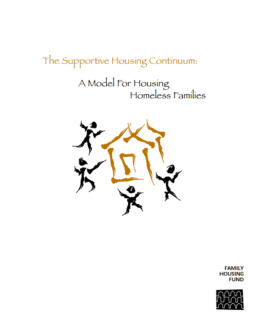The Supportive Housing Continuum: A Model for Housing Homeless Families
This report proposes the development of a comprehensive system of supportive housing that combines affordable housing with services for homeless families. This was a distinct departure from the primary response to homeless families at the time—transitional housing.
Whereas transitional housing is a type of supportive housing that provides a short-term bridge for families between emergency shelters and permanent housing, a comprehensive supportive housing system encompasses a wide range of programs including intensive services such as employment training, counseling, and childcare. Transitional housing services are available from 6 to 24 months, while a comprehensive supportive housing system would allow service providers to determine the families’ length of stay in the programs.
In the 1990s, cities were interested in making large investments in supportive housing projects as a means to address the rising rates of homelessness. Family Housing Fund was at the forefront of the Twin Cities’ supportive housing movement, researching supportive housing and investing in thousands of supportive housing units.
This report analyzes the costs of providing supportive housing versus the costs of providing emergency services to homeless families and proposes strategies for funding the stabilization of supportive housing programs and adding housing units. Family Housing Fund concluded that the success of a comprehensive supportive housing system required a major new financial commitment from the public and private sector. Additionally, a sufficient supply of affordable housing is necessary for families ready to leave supportive housing.
How much would a supportive housing system cost? Read a cost-analysis of interventions with or without a supportive housing system in place: Financial Implications of Public Interventions On Behalf of a Chronically Homeless Family
What are the effects of homelessness that supportive housing aims to address? Read: Homelessness and its Effects on Children
